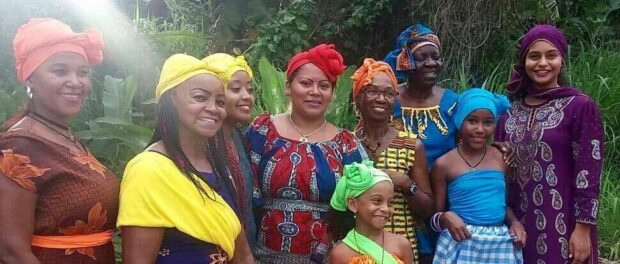
Concluding Black Awareness week on November 26, the Cultural Association of the Camorim Quilombo (ACUCA) hosted its sixteenth traditional feijoada in honor of Afro-Brazil’s greatest resistance leaders Dandara and Zumbi dos Palmares in Jacarepaguá, in Rio de Janeiro’s West Zone. This was the first time the event was held on the quilombo’s (maroon community) own land, which made the day all the more special.
Adilson Almeida, founder and president of ACUCA, kicked off the afternoon in high spirits, saying “this cultural and historical event is already a huge victory.” The undertaking of the event within the territory itself would not have been possible if the quilombo was not the owner of this land, the result of more than a decade of struggle. The Camorim Quilombo received its certification from the Palmares Cultural Foundation (FPC) three years ago, which recognized the community’s self-identification as a quilombo in 2014, and the Engenho do Camorim Archaeological Site was recently certified by the National Institute of Historic and Artistic Heritage (IPHAN) as a place of cultural and historical significance.
The certification by the FPC is required under presidential decree in order to obtain the collective title to the land from the National Institute for Colonization and Agrarian Reform (INCRA). Camorim’s process with INCRA is ongoing.
The recognition process for the Engenho do Camorim Archaeological Site relied on the technical support of the archaeologist and doctoral student Silvia Peixoto, who opened the event alongside Almeida. For her, the event’s occurrence for the first time within this space was “of immeasurable importance, because it’s a really important cultural and political appropriation of the space. An archaeological site is everyone’s heritage, and more than anyone, this space belongs to the Camorim Quilombo.” Her survey of the quilombo’s history revealed an archaeological site with more than 7,000 artifacts from the mid-seventeenth century. A guided tour of the quilombo was created to share and celebrate this legacy.
Almeida and Peixoto mourned the destruction of a number of these artifacts, as well as large swaths of trees native to the Atlantic Forest, after Living, a subsidiary of the construction group Cyrela, began development on the quilombo lands to house the Rio 2016 Olympic Media Village and subsequently sell the properties on the real estate market. But as an archaeological site, the land is now protected from any further forms of construction, Peixoto explained. Almeida would now like for the new residents in the new condominium to come to the quilombo and get to know the land in which they have chosen to live. The president of ACUCA announced an open invitation for these new residents, as well as people from other parts of the city, to come to the quilombo and do away with any negative image they may have of the space: “We live and breathe history here, so let’s hope we can all come together.” Various activities such as eco walks, visits to the archaeological area, and school field trips are already being organized within the quilombo space.
Events like the traditional feijoada cook-out at the Camorim Quilombo help deconstruct the negative image people have of quilombos along with the prejudice and racism that go along with them. Almeida and ACUCA want to revive the area’s history and convey a positive image of the space through its culture, traditions, history, and celebration. The events are secular and open to everyone regardless of religious background. Indeed, this is a central issue for ACUCA, which hosts an annual debate addressing religious intolerance.
For activist Sandra Helena Lobato, who was at the event, initiatives like the quilombo’s feijoada are essential for reconciling and demystifying the image of quilombos. As a member of the Baptist Church and a militant black activist, she believes the ability to separate art and culture from religion is important for helping people come together. In the context of recent attacks against followers of Afro-Brazilian religions, “it is exceedingly important to show that we can and must unite while respecting one another’s religion.” However, Lobato also expressed her disappointment at how many locals still don’t understand and empathize with this struggle or the need to support it. For her, an event like this is essential for black people to appear and position themselves in a positive light in a covertly racist society.
Events like the feijoada in honor of Dandara and Zumbi dos Palmares are necessary to continue strengthening black and quilombo identities so that “young people have a consciousness of being from a quilombo, and know they don’t have to bow their head to anyone,” Almeida said.
In addition to the amazing feijoada, there was also no shortage of celebration and culture. A variety of activities livened up the entire afternoon: a jongo dance workshop with the participation of kids from the capoeira project, a pagode band from Mesquita (a city in the state of Rio de Janeiro) singing songs of black resistance, an “AfroFashion” show with clothes inspired by different countries in Africa, and a poetry slam hosted by the youth group Slam Nós da Rua. As such, “every person had a part in creating this environment, part of the history that belongs to all,” Almeida said emotionally.
To book a visit, call Adilson Almeida at +55 21 98320 2634 or get in touch via the Facebook page or the ACUCA website.
ACUCA would like to thank and acknowledge a number of partners in the event’s success: Anderson Awvas from Ilustração e Design, Nega Rosa, Bijucaliente Moda and Cia, Dith Biju, Silvia Helena from Claridanda Artesanato, Lucimar Trancista from Dream Hair, Fátima Balbi from Mary Key, Eliane Ribeiro from Oficina de Abayomis, Maria Rivanilda from Odara Mania de Ser, Amaury and Tadeu from By Soares, Daniel Farias from Elo e Urucum, Universo Submerso, and Clínica da Família from Curicica, as well as INEA and all those whose participation made the event so special.




